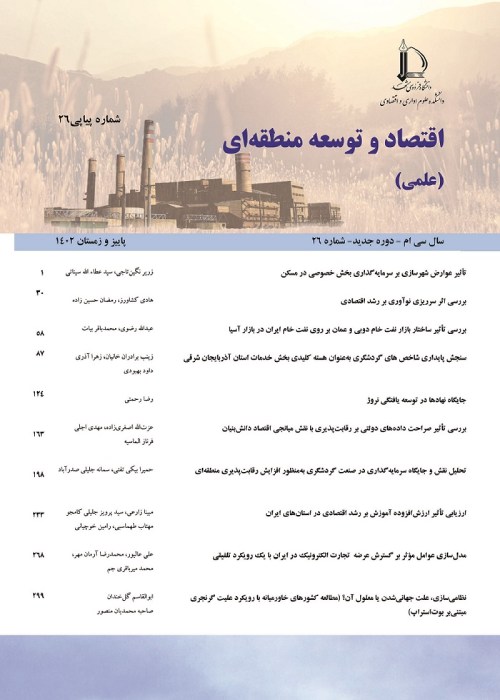Militarization, the Cause of Globalization or Its Effect? (Study of Middle East Countries by Using Bootstrap Panel Granger Causality Approach)
Globalization has been rising over the years and the trend seems perpetual. Ideas, technology, resources and final goods are progressively mobile across international borders. Consequently, the economic conditions in most developing countries are not exclusively decided by internal policies and market situations. The world continues to witness intensified interdependence and competition between economies in addition to more benefits to developing countries in terms of more access to international markets, intensify technology transfer from more developed nations. On the other hand, nowadays militarization continues under the impact of technological advances, infrastructural development, geopolitical competition and growth in troop size. In this regard, one of the important economic debates is whether globalization leads to the expansion of militarization (positive causality from globalization to militarization) or helps to control it and promote peace (negative causality from globalization to militarization)? Or vice versa, is it the militarization that slows down the process of globalization (negative causality from militarization to globalization) or does it enable the presence in international markets (positive causality from militarization to globalization)?According to these points, the aim of this paper is to examine the causality between globalization and militarization for the 12 Middle East countries that have the highest level of militarization in this region over the period 2000-2020.
THEORETICAL FRAMEWORK:
There are arguments in favour of positive impact of globalisation on military expenditure. For instance, it is argued that globalisation stimulates defense spending over social expenditure. Moreover, security concessions in free trade arrangements makes it easy for governments to expand military expenditure, but put restrictions on social expenditure. There are arguments in favour of the negative impact of globalisation on military spending. It is opined that military expenditure should fall significantly due to economic liberalisation and globalization. With the rising quest for the acquisition of wealth through trade and economic liberalisation, countries are progressively hesitant to use military means to resolve inter-state disputes. Furthermore, with the emergence of the unparalleled forces of globalisation, particularly after the Cold War ended, the function of the state as provider of security is believed to be on the decrease.Moreover, the reverse causation can also be applicable that is, in the presence of conflict and civil war the governments increase their military expenditures in order to promote the nation state and enhancing their territorial jurisdictions. As a result, internationalization or global integration needs to be forgone. In contrast to the increase in militarization due to the need to import technology and advanced weapons as well as the export of manufactured weapons, it enables the presence in international markets, which leads to the improvement of the level of globalization.
The data used in this study covers the period 2000–2020 for the 12 Middle East countries that have the highest level of militarization in this region (Turkey, UAE, Egypt, Iran, Iraq, Lebanon, Jordan, Bahrain, Saudi Arabia, Kuwait, Oman and Israel). The chosen time period stems from the availability of data. The variables used in this study include the global militarization index (MIL), the overall globalization index (GLOB), and per capita real GDP (GDPC) as a control variable. The overall globalization index includes economic, social, and political globalization. The economic globalization (36%) consists of actual flows, trade and capital account restrictions. The social globalization (38%) involves data on personal contact, information flows, and cultural proximity. The political globalization (26%) consists of number of embassies in the country, membership in international organizations, participation in UN security-council missions, and international treaties. The variables are expressed in log forms. Data is obtained from the World Bank’s World Development Indicators, KOF Swiss Economic Institute’s overall globalization index, and Bonn International Center for Conversation (BICC).The estimation of the model has also been done by using the causality test in heterogeneous mixed panels (Presented by Emirmahmutoglu & Kose (2011)), which is based on the Vector Auto Regressive (VAR) model and Wald tests with specific bootstrap critical values for each country. The panel causality method presented by Emirmahmutoglu & Kose (2011) consists of a system, including two sets of equations as follows: In the above relationship, y indicates globalization and x refers to militarization. N is the number of panel members (j=1,..,N), t is the time period (t=1,..,T), l is the optimal lag length and is the maximum degree of stationary of the model variables between each of the panel members. To test for Granger causality in this system, alternative causal relations for each country are likely to be found: (1) there is one-way Granger causality from X to Y if not all are zero, but all are zero; (2) there is one-way Granger causality from Y to X if all are zero, but not all are zero; (3) there is two-way Granger causality between X and Y if neither nor are zero; and (4) there is no Granger causality between X and Y if all and are zero.
Empirical results show the existence of a positive one-way causality relationship from the side of militarization to globalization (the hypothesis of militarization leading to an increase in globalization) in Egypt and Israel, a negative one-way causality relationship from the side of militarization to globalization (the hypothesis of militarization leading to a decrease in globalization) in the countries of Turkey and the UAE, a negative one-way causality relationship from globalization to militarization (hypothesis of globalization leads to limiting militarization) in the country of Oman, a negative two-way causality relationship between militarization and globalization (feedback hypothesis) in the country of Kuwait and non-causality relationship between militarization and globalization (neutral hypothesis) for the countries of Iran, Iraq, Lebanon, Jordan, Bahrain and Saudi Arabia. Also, the non-causality relationship between globalization and militarization (or the neutral hypothesis) is confirmed for the total panel.
CONCLUSIONS & SUGGESTIONS:
In general, based on the results, it can be said that globalization does not affect the process of militarization in the countries of the Middle East region and is not a threat to security in the countries of this region. Therefore, through globalization and moving towards an open economy, the countries of this region can provide the necessary platforms for things like attracting technology, capital and financial resources, regional and global arrangements, and joint investment in the fields of knowledge; Without this issue being a serious threat to security and the level of militarization in the Middle East region. Also, it is suggested that in the future studies, a more detailed examination of the research subject will be done by separating globalization into economic, political and social globalization types.
- حق عضویت دریافتی صرف حمایت از نشریات عضو و نگهداری، تکمیل و توسعه مگیران میشود.
- پرداخت حق اشتراک و دانلود مقالات اجازه بازنشر آن در سایر رسانههای چاپی و دیجیتال را به کاربر نمیدهد.



